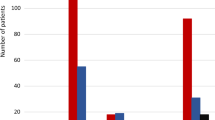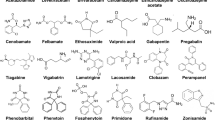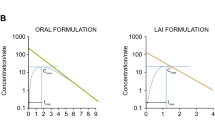Abstract
Background
Placebo response in clinical trials for anti-epileptic drugs (AEDs) has been examined and a recent meta-analysis revealed that East Asian trials showed unexpectedly higher placebo response. As multi-national trials have become common, it is important to understand placebo response in different settings, including regions/countries for future clinical trials.
Objective
The present meta-analysis aims to investigate the potential factors that contribute to higher placebo response in clinical trials for add-on therapy to adult patients with refractory partial epilepsy in East Asian and Western populations.
Methods
A database was established based on published clinical trials conducted in East Asian and Western countries. The relationship between the degree of placebo response and potential influencing factors was examined by logistic regression analyses.
Results
The database included 33 trials from five AEDs: gabapentin, topiramate, levetiracetam, pregabalin, and zonisamide. Placebo response was associated with patient characteristics such as disease duration, percentage of patients with complex partial seizure (CPS) at baseline, percentage of patients treated with two AEDs, protocol-required seizure frequency at baseline, and year of publication. Logistic regression analysis demonstrated that the placebo response in East Asian trials was statistically higher than that in Western trials.
Conclusion
Patient characteristics such as longer disease duration and CPS at baseline contribute to a reduction in placebo response in clinical trials of AEDs for partial epilepsy. While the reasons for the geographical difference in placebo response are not clear, these and other patient characteristics contributing to placebo response should be carefully considered in the design of future clinical trials of AEDs for partial epilepsy.





Similar content being viewed by others
References
Farrar JT. Advances in clinical research methodology for pain clinical trials. Nat Med. 2010;16:1284–93.
Kirsch I, Sapirstein G. Listening to Prozac but hearing placebo: a meta-analysis of antidepressant medication. Prevention and treatment, vol. 1(2), 1998. http://psycnet.apa.org/journals/pre/1/2/2a/. Accessed 17 Oct 2012.
Guekht AB, Korczyn AD, Bondareva IB, et al. Placebo responses in randomized trials of antiepileptic drugs. Epilepsy Behav. 2010;17:64–9.
Benedetti F, Carlino E, Pollo A. How placebos change the patient’s brain. Neuropsychopharmacology. 2011;36(1):339–54.
Walsh BT, Seidman SN, Syskol R. Placebo response in studies of major depression: variable, substantial and growing. JAMA. 2002;287:1840–7.
Niklson I, Edrich P, Verdru P. Identifying baseline characteristics of placebo responders versus nonresponders in randomized double-blind trials of refractory partial-onset seizures. Epileptic Disord. 2006;8:37–44.
Rheims S, Perucca E, Cucherat M, et al. Factors determining response to antiepileptic drugs in randomized controlled trials: a systematic review and meta-analysis. Epilepsia. 2011;52:219–33.
Perucca E. Why are epilepsy trials failing? Interview with Emilio Perucca. Clin Invest. 2011;1:1479–85.
UK Gabapentin Study Group. Gabapentin in partial epilepsy. Lancet. 1990;335:1114–7.
Pharmaceuticals and Medical Devices Agency [in Japanese]. Gabapentin CTD Study 877-210P. http://www.info.pmda.go.jp/shinyaku/P200600026/index.html. Accessed 13 May 2012.
The US Gabapentin Study Group No. 5. Gabapentin as add-on therapy in refractory partial epilepsy: a double-blind, placebo-controlled, parallel-group study. Neurology. 1993;43:2292–8.
Pharmaceuticals and Medical Devices Agency [in Japanese]. Gabapentin CTD Study 945-5. http://www.info.pmda.go.jp/shinyaku/P200600026/index.html. Accessed 25 Jul 2012.
Anhut H, Ashman P, Feuerstein TJ, The International Gabapentin Study Group, et al. Gabapentin (Neurontin) as add-on therapy in patients with partial seizures: a double blind, placebo-controlled study. Epilepsia. 1994;35:795–801.
Pharmaceuticals and Medical Devices Agency [in Japanese]. Gabapentin CTD Study 945-6. http://www.info.pmda.go.jp/shinyaku/P200600026/index.html. Accessed 25 Jul 2012.
Pharmaceuticals and Medical Devices Agency [in Japanese]. Gabapentin CTD Study 945-9/10. http://www.info.pmda.go.jp/shinyaku/P200600026/index.html. Accessed 25 Jul 2012.
Yamauchi T, Kaneko S, Yagi K, et al. Treatment of partial seizures with gabapentin: double-blind, placebo-controlled, parallel-group study. Psychiatry Clin Neurosci. 2006;60:507–15.
Pharmaceuticals and Medical Devices Agency [in Japanese]. Gabapentin CTD Study 945-08J. http://www.info.pmda.go.jp/shinyaku/P200600026/index.html. Accessed 25 Jul 2012.
Faught E, Wilder BJ, Ramsay RE, et al. Topiramate placebo-controlled dose-ranging trial in refractory partial epilepsy using 200-, 400-, and 600-mg daily dosages. Neurology. 1996;46:1684–90.
Pharmaceuticals and Medical Devices Agency [in Japanese]. Topiramate CTD Study YD. http://www.info.pmda.go.jp/shinyaku/P200700033/index.html. Accessed 25 Jul 2012.
Privitera M, Fincham R, Penry J, et al. Topiramate placebo-controlled dose-ranging trial in refractory partial epilepsy using 600-, 800-, and 1000-mg daily dosages. Neurology. 1996;46:1678–83.
Pharmaceuticals and Medical Devices Agency [in Japanese]. Topiramate CTD Study YE. http://www.info.pmda.go.jp/shinyaku/P200700033/index.html. Accessed 25 Jul 2012.
Ben-Menachem E, Henriksen O, Dam M, et al. Double-blind, placebo-controlled trial of topiramate as add-on therapy in patients with refractory partial seizures. Epilepsia. 1996;37:539–43.
Tassinari CA, Michelucci R, Chauvel P, et al. Double-blind, placebo-controlled trial of topiramate (600 mg daily) for the treatment of refractory partial epilepsy. Epilepsia. 1996;37:763–8.
Sharief M, Viteri C, Ben-Menachem E, et al. Double-blind, placebo-controlled study of topiramate in patients with refractory partial epilepsy. Epilepsy Res. 1996;25:217–24.
Yen DJ, Yu HY, Guo YC, et al. A double-blind, placebo-controlled study of topiramate in adult patients with refractory partial epilepsy. Epilepsia. 2000;41:1162–6.
Guberman A, Neto W, Gassmann-Mayer C. Low-dose topiramate in adults with treatment-resistant partial-onset seizures. Acta Neurol Scand. 2002;106:183–9.
Korean Topiramate Study Group. Topiramate in medically intractable partial epilepsies: double-blind placebo-controlled randomized parallel group trial. Epilepsia. 1999;40:1767–74.
Pharmaceuticals and Medical Devices Agency [in Japanese]. Topiramate CTD Study 9809. http://www.info.pmda.go.jp/shinyaku/P200700033/index.html. Accessed 25 Jul 2012.
Matsuda K, Yagi K. A phase-III clinical study of topiramate (KW-6485) in symptomatic localization-related epilepsy: a double-blind, placebo-controlled parallel group comparative study [in Japanese]. J New Rem Clin. 2007;56:1385–403.
Cereghino JJ, Biton V, Abou-Khalil B, et al. Levetiracetam for partial seizures: results of a double-blind, randomized clinical trial. Neurology. 2000;55:236–42.
Pharmaceuticals and Medical Devices Agency [in Japanese]. Levetiracetam CTD Study N132. http://www.info.pmda.go.jp/shinyaku/P201000046/index.html. Accessed 25 Jul 2012.
Tsai JJ, Yen DJ, Hsih MS, et al. Efficacy and safety of levetiracetam (up to 2000 mg/day) in Taiwanese patients with refractory partial seizures: a multicenter, randomized, double-blind, placebo-controlled study. Epilepsia. 2006;47:72–81.
Pharmaceuticals and Medical Devices Agency [in Japanese]. Levetiracetam CTD Study N1005. http://www.info.pmda.go.jp/shinyaku/P201000046/index.html. Accessed 25 Jul 2012.
Shorvon SD, Lowenthal A, Janz D, et al. Multicenter double-blind, randomized, placebo-controlled trial of levetiracetam as add-on therapy in patients with refractory partial seizures. Epilepsia. 2000;41:1179–86.
Ben-Menachem E, Falter U. Efficacy and tolerability of levetiracetam 3000 mg/d in patients with refractory partial seizures: a multicenter, double-blind, responder-selected study evaluating monotherapy. Epilepsia. 2000;41:1276–83.
Xiao Z, Li JM, Wang XF, et al. Efficacy and safety of levetiracetam (3,000 mg/day) as an adjunctive therapy in Chinese patients with refractory partial seizures. Eur Neurol. 2009;61:233–9.
Peltola J, Coetzee C, Jimenez F, et al. Once-daily extended-release levetiracetam as adjunctive treatment of partial-onset seizures in patients with epilepsy: a double-blind, randomized, placebo-controlled trial. Epilepsia. 2009;50:406–14.
Wu XY, Hong Z, Wu X, et al. Multicenter double-blind, randomized, placebo-controlled trial of levetiracetam as add-on therapy in Chinese patients with refractory partial-onset seizures. Epilepsia. 2009;50:398–405.
Pharmaceuticals and Medical Devices Agency [in Japanese]. Levetiracetam CTD Study N165. http://www.info.pmda.go.jp/shinyaku/P201000046/index.html. Accessed 25 Jul 2012.
Yagi K, Kameyama S, Kaneko S, et al. Multicenter, double-blind, randomized, placebo-controlled study of levetiracetam as add-on therapy in Japanese patients with uncontrolled partial seizures [in Japanese]. J Jpn Epil Soc. 2010;28:3–16.
Pharmaceuticals and Medical Devices Agency [in Japanese]. Levetiracetam CTD Study N01221. http://www.info.pmda.go.jp/shinyaku/P201000046/index.html. Accessed 25 Jul 2012.
Lee BI, Yi S, Hong SB, et al. Pregabalin add-on therapy using a flexible, optimized dose schedule in refractory partial epilepsies: a double-blind, randomized, placebo-controlled, multicenter trial. Epilepsia. 2009;50:464–74.
French JA, Kugler AR, Robbins JL, et al. Dose response trial of pregabalin adjunctive therapy in patients with partial seizures. Neurology. 2003;60:1631–7.
Beydoun A, Uthman BM, Kugler AR, et al. Safety and efficacy of two pregabalin regimens for add-on treatment of partial epilepsy. Neurology. 2005;64:475–80.
Elger CE, Brodie MJ, Anhut H, et al. Pregabalin add-on treatment in patients with partial seizures: a novel evaluation of flexible-dose and fixed-dose treatment in a double-blind, placebo-controlled study. Epilepsia. 2005;46:1926–36.
Arroyo S, Anhut H, Kugler AR, et al. Pregabalin add-on treatment: a randomized, double-blind, placebo-controlled, dose-response study in adults with partial seizures. Epilepsia. 2004;45:20–7.
Sackellares JC, Ramsay RE, Wilder BJ, et al. Randomized, controlled clinical trial of zonisamide as adjunctive treatment for refractory partial seizures. Epilepsia. 2004;45:610–7.
Lu Y, Xiao Z, Yu W, et al. Efficacy and safety of adjunctive zonisamide in adult patients with refractory partial-onset epilepsy. A randomized, double-blind, placebo-controlled trial. Clin Drug Investig. 2011;31:221–9.
Faught E, Ayala R, Montouris GG, et al. Randomized controlled trial of zonisamide for the treatment of refractory partial-onset seizures. Neurology. 2001;57:1774–9.
Brodie MJ, Duncan R, Vespignani H, et al. Dose-dependent safety and efficacy of zonisamide: a randomized, double-blind, placebo-controlled study in patients with refractory partial seizures. Epilepsia. 2005;46:31–41.
Schmidt D, Jacob R, Loiseau P, et al. Zonisamide for add-on treatment of refractory partial epilepsy: a European double blind trial. Epilepsy Res. 1993;15:67–73.
Irving G. The placebo response: relationship to outcomes in trials of postherpetic neuralgia. Clin Drug Investig. 2010;30:739–48.
Kaptchuk TJ, Kelley JM, Deykin A, et al. Do “placebo responders” exist? Contemp Clin Trials. 2008;29:587–95.
Dworkin RH, Katz J, Gitlin MJ. Placebo response in clinical trials of depression and its implications for research on chronic neuropathic pain. Neurology. 2005;65(Suppl 4):S7–19.
Berg AT, Berkovic SF, Brodie MJ, et al. Revised terminology and concepts for organization of seizures and epilepsies: report of the ILAE commission on classification and terminology, 2005–2009. Epilepsia. 2010;51:676–85.
Ben-Menachem E, Sander JW. Vigabatrin therapy for refractory complex partial seizures: review of major European trials. Acta Neurol Scand. 2011;124(Suppl. 192):16–28.
Deacon C, Wiebe S, Blume WT, et al. Seizure identification by clinical description in temporal lobe epilepsy: how accurate are we? Neurology. 2003;61:1686–9.
Jones RW, Schwam E, Wilkinson D, et al. Rates of cognitive change in Alzheimer disease observations across a decade of placebo-controlled clinical trials with donepezil. Alzheimer Dis Assoc Disord. 2009;23:357–64.
Acknowledgments
The authors have no conflicts of interest that are directly relevant to this meta-analysis. The preparation of this manuscript was not supported by any external funding.
Author information
Authors and Affiliations
Corresponding author
Rights and permissions
About this article
Cite this article
Tachibana, Y., Narukawa, M. Investigation of Influencing Factors on Higher Placebo Response in East Asian Versus Western Clinical Trials for Partial Epilepsy: A Meta-Analysis. Clin Drug Investig 33, 315–324 (2013). https://doi.org/10.1007/s40261-013-0077-x
Published:
Issue Date:
DOI: https://doi.org/10.1007/s40261-013-0077-x




